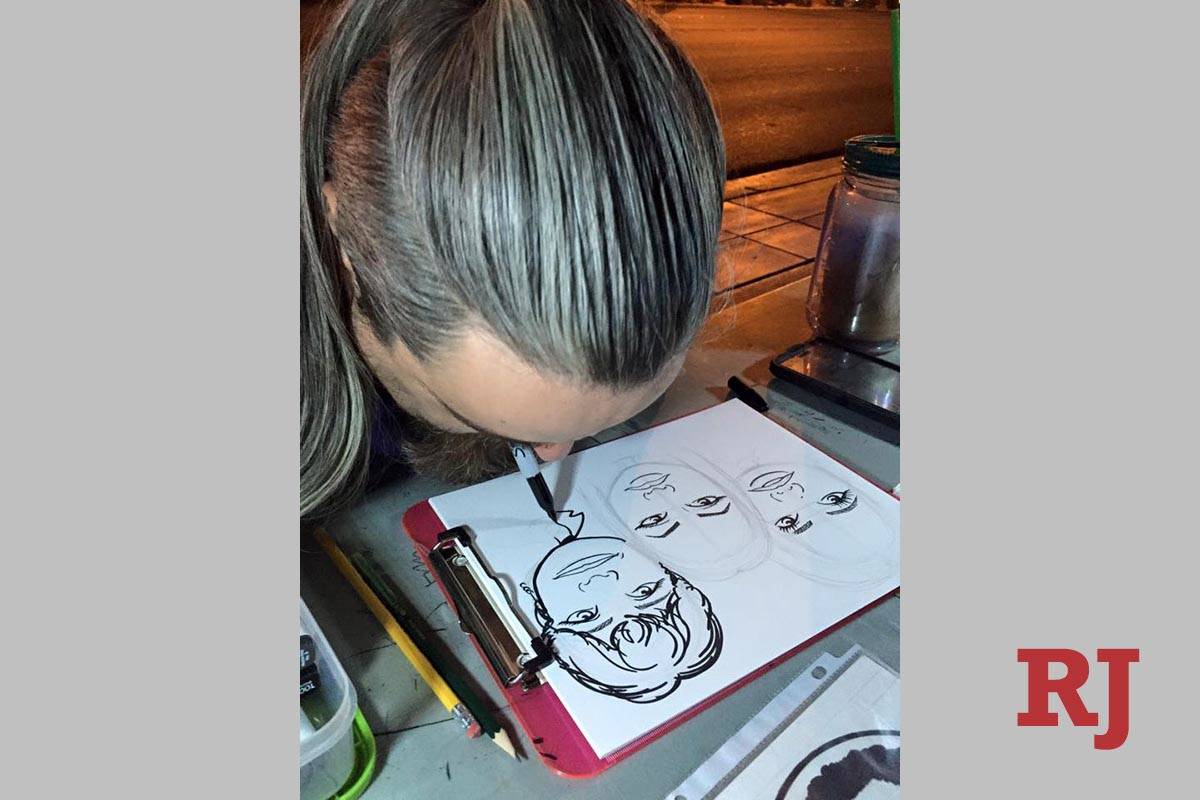Disabled Las Vegas street artist settles with police for $150K
Nearly four years after Las Vegas police first gave Larime Taylor a ticket while he was performing on the Strip, a lawsuit filed by the artist has reached a $150,000 settlement.
“It was beyond frustrating — it was demoralizing, it was degrading, it was dehumanizing,” Taylor said when recalling how Metropolitan Police Department officers gave him citations while he performed “live art” in front of the Bellagio fountains.
Taylor has arthrogryposis multiplex congenita, a disease that limits the use of his arms and legs. When he performed, he drew with a pencil, pen or marker in his mouth, according to the 2019 lawsuit filed in federal court.
The lawsuit alleged that Las Vegas police violated Taylor’s First Amendment rights by issuing him 10 citations from June 2017 to July 2019. All but one of the citations were dismissed, and Taylor’s only conviction was overturned, according to court documents.
On April 26, Metro’s fiscals affairs committee approved a $150,000 settlement in the lawsuit.
“We can hope that by having to pay, that Metro and the sheriff will understand that they need to once and for all get the message from the federal courts that they have to respect people’s First Amendment rights on the sidewalks along the Las Vegas Strip,” Taylor’s attorney, Maggie McLetchie, told the Review-Journal on Friday.
Metro did not respond to a request for comment.
Restraining order
When performing, Taylor backed his wheelchair against a guard rail in front of the Bellagio fountains and drew on a small folding table in front of him, the lawsuit said.
The citations stemmed from a Clark County ordinance that states property cannot be “stored, placed or abandoned in or on the public sidewalk,” but the lawsuit alleged that Taylor’s wheelchair and small table are necessary for his performance.
In November 2019, U.S. District Judge James C. Mahan granted Taylor an order restraining police from citing him for performing on the Strip, court records show.
In court documents ordering the temporary restraining order, the judge argued that Taylor “has taken every measure available to him to avoid obstructing the sidewalk.” And while Metro argued that the county ordinance does not specify that a painter is a street performer, the federal judge said Taylor’s live drawing was “a performing act.”
Taylor told the Review-Journal he performed in front of the Bellagio to support himself and his wife, who was going through chemotherapy at the time police issued him citations. He claimed officers would approach him multiple times a week, and although he explained the Clark County ordinance, officers would threaten him with arrest if he didn’t leave.
“They would tell me to get a real job,” Taylor said. “And I said, ‘Look at me: I can’t flip burgers, I can’t wash bathrooms, but I can draw, and what I do is legal.’ This is what I do, this is who I am, and they didn’t care.”
Taylor hasn’t performed on the Strip in more than a year because of the coronavirus pandemic. He plans to return once he feels safe, but the money from the settlement and landing a job helping to develop a TV series has made him and his wife more financially stable, he said.
But Taylor is still frustrated with police, and he and McLetchie, who is also an attorney for the Review-Journal, hope that the settlement will prevent future citations.
In body-worn camera footage previously released by Metro, Taylor is seen talking to two officers who detained him in front of the Bellagio on July 29, 2019. Taylor told one of the officers that arresting him is going against the county ordinance.
“Well I haven’t heard that ruling, and we’re being told something else,” the officer said.
McLetchie said multiple officers issuing citations shows a “systemic problem” with training in the department.
When the citations started in 2017, Taylor had already performed on the Strip for five years without incident, according to the lawsuit. But officers weren’t just “harassing” Taylor; they were also citing other street performers, McLetchie said.
“There aren’t enough lawyers to take all the cases of people whose First Amendment rights have been violated by Metro on the Strip,” McLetchie said.
Contact Katelyn Newberg at knewberg@reviewjournal.com or 702-383-0240. Follow @k_newberg on Twitter.























